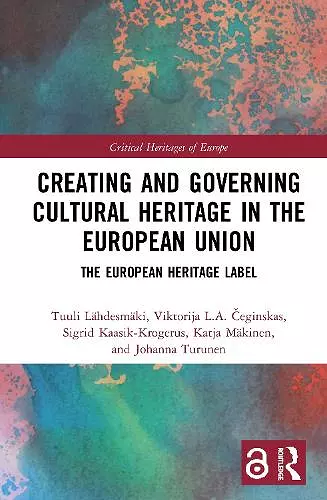Creating and Governing Cultural Heritage in the European Union
The European Heritage Label
Tuuli Lähdesmäki author Katja Mäkinen author Sigrid Kaasik-Krogerus author Johanna Turunen author Viktorija LA Čeginskas author
Format:Hardback
Publisher:Taylor & Francis Ltd
Published:14th May '20
Currently unavailable, and unfortunately no date known when it will be back
This hardback is available in another edition too:
- Paperback£42.99(9781032236254)

Creating and Governing Cultural Heritage in the European Union: The European Heritage Label provides an interdisciplinary examination of the ways in which European cultural heritage is created, communicated, and governed via the new European Heritage Label scheme.
Drawing on ethnographic field research conducted across ten countries at sites that have been awarded with the European Heritage Label, the authors of the book approach heritage as an entangled social, spatial, temporal, discursive, narrative, performative, and embodied process. Recognising that heritage is inherently political and used by diverse actors as a tool for re-imagining communities, identities, and borders, and for generating notions of inclusion and exclusion in Europe, the book also considers the idea of Europe itself as a narrative. Chapters tackle issues such as multilevel governance of heritage; geopolitics of border-crossings and border-making; participation and non-participation; and embodiment and affective experience of heritage.
Creating and Governing Cultural Heritage in the European Union advances heritage studies with an interdisciplinary approach that utilises and combines theories and conceptualizations from critical geopolitics, political studies, EU and European studies, cultural policy research, and cultural studies. As such, the volume will be of interest to scholars and students engaged in the study of heritage, politics, belonging, the EU, ideas, and narratives of Europe.
This important book traces the political, social and economic consequences of the European Heritage Label. Drawing on extensive ethnographic fieldwork and policy analysis, the book provides a nuanced account of how European heritage narratives are formed, maintained and challenged and the tensions they create over European identity, inclusion and exclusion. In the context of the rise of populism and challenges to European unity, the book is a call for both critical heritage scholars and practitioners to assess and challenge complacencies in heritage narratives and work toward more inclusive practices. This is essential reading not simply for heritage scholars and practitioners working within Europe, but also for those interested in detailed analyses of the impact of heritage practices and policies.
Laurajane Smith, director of the Centre for Heritage and Museum Studies, and professor of heritage and museum studies, the Australian National University, Canberra. Editor of the International Journal of Heritage Studies.
Based on an impressively thorough and rigorous multi-researcher project in a range of countries within Europe, this careful and in-depth analysis of the making and reception of the European Heritage label manages to be illuminating of the workings of EU heritage-making more widely. By showing the sometimes subtle ways in which heritage can exclude – even against the best of intentions – it contributes to the formation of a much-needed more equitable and inclusive heritage practice.
Sharon Macdonald, Director of CARMAH (Centre for Anthropological Research on Museums and Heritage) and Professor of Social Anthropology at the Humboldt University, Berlin, and author of Memorylands. Heritage and Identity in Europe Today (Routledge) and Difficult Heritage. Negotiating the Nazi Past in Nuremberg and Beyond (Routledge).
Creating and Governing Cultural Heritage in the European Union is a highly original and enlightening book based on ambitious, interdisciplinary collective research. Thanks to its unprecedented ‘ethnography of European cultural heritage’, it makes a major contribution to the study of European cultural identity. While wisely focusing on a specific EU programme, the European Heritage Label, the authors explore far-reaching issues related to the construction of an EU space and community and to the emergence of narratives of Europe. The strength of this monograph lies in the rich data collected which reveal multifacted Europeanization processes among diverse actors such as EU officials, cultural practitioners and visitors. The reading of this book will be very valuable for graduate students and scholars of the EU from various disciplines, and for anyone interested in the uses of culture and heritage in European politics.
Oriane Calligaro, Associate Professor in Political Science at ESPOL, Université catholique de Lille, France
ISBN: 9780367148355
Dimensions: unknown
Weight: 720g
284 pages